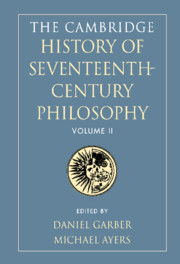34 - Conceptions of moral philosophy
from VII - Will, Action, and Moral Philosophy
Published online by Cambridge University Press: 28 March 2008
Summary
A new conception of moral philosophy began to emerge in the seventeenth century. The discipline was no longer to rest on the foundation of authority, whether classical or Christian; it was to become, instead, a systematic science, grounded on logically rigorous deductions from self-evident principles. This rethinking of the epistemological status of moral philosophy took place against the background of a general reaction against ancient authority on the part of contemporary philosophers such as Descartes and Hobbes. Nevertheless, throughout the century, both in the universities and in the popular mind, the traditional forms of ethics, based on classical philosophy or Christian theology, dominated the scene. Ethical thought within the methodological boundaries set by the past – and the majority of works produced in the seventeenth century fall into this category – was not necessarily intellectually stagnant. While some traditional conceptions remained relatively static, others underwent considerable change, occasionally under the impact of the new ethical ideas put forward by the modernists.
The general pattern followed by traditional moral philosophy in the seventeenth century had been established during the Renaissance. Classical ethics was represented by the four major schools: Aristotelian, Stoic, Platonic, and Epicurean. Christian ethics, whose primary domain was the field of moral theology, was used as a yardstick against which the classical systems were measured; a few thinkers, however, rejected pagan thought completely and wanted to create an independent Christian moral philosophy. The ethical conceptions embodied in these traditions differed considerably in doctrinal content, at times coming into open conflict.
- Type
- Chapter
- Information
- The Cambridge History of Seventeenth-century Philosophy , pp. 1279 - 1316Publisher: Cambridge University PressPrint publication year: 2000
References
- 11
- Cited by



